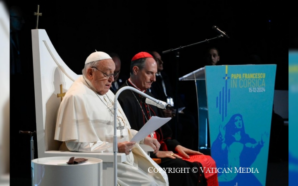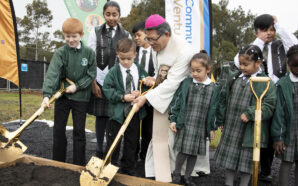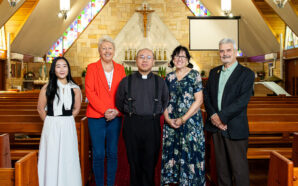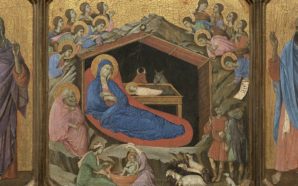Homily for the Solemnity of Pentecost, Year C 2022
Readings: Acts 2:1-11; Psalm 103(104): 1, 24, 29-31, 24; Romans 8:8-17; John 14:15-16, 23-26
5 June 2022
A month ago, I was called to my father’s bedside to anoint him. Death seemed imminent. Some days later, he apologised to one of my siblings who was due to undergo surgery on 16 May. He had hoped that he would die in time for his funeral to be well and truly over before the date of the surgery. As it turned out, he lived another month often saying, “I just wish the good Lord would take me. This is so tedious.” I was privileged to be able to spend considerable time with him in those extra days of life. It’s those days and his ultimate death which give meaning to me this feast of Pentecost.
LISTEN: https://soundcloud.com/frank-brennan-6/homily-5622
To be blunt, I’ve never made much of St Paul’s declaration to the Romans about things spiritual and unspiritual. In today’s second reading, Paul says: “Your interests are not in the unspiritual, but in the spiritual, since the Spirit of God has made his home in you. In fact, unless you possess the spirit of Christ you would not belong to him.” Paul goes on to say: “The spirit you received is not the spirit of slaves bringing fear into your lives again; it is the spirit of sons, and it makes us cry out, ‘Abba, Father!’ The Spirit himself and our spirit bear united witness that we are children of God.”
A few days before Dad’s death, I was attending a public meeting. A woman introduced herself and thanked me for my father. He had been the chancellor of the university from which her daughter had graduated in nursing many years before. She vividly recalls the chancellor’s graduation address. The graduands were all future nurses or teachers. He said to them: “As nurses and teachers, you will never earn a lot of money. But you have the opportunity to enjoy the most fulfilled of lives. As nurses, you will accompany people at the most vulnerable stages of their lives. As teachers, you will have the opportunity to provide all manner of young people with access to a life of meaning, fulfilment and purpose.”
In the days leading up to his death, nothing gave him greater consolation than to have one of his children, at lights out, pray the prayer of Ignatius Loyola: “Take, Lord, receive all my liberty, my memory, my understanding, my whole will, all that I have and all that I possess. You gave it all to me, Lord; I give it all back to you.”
That would be followed by the prayer of Pedro Arrupe, the Jesuit Superior General who established the Jesuit Refugee Service and who suffered a mammoth stroke after flying back from Bangkok to Rome. During his long years of incapacity Arrupe prayed:
“More than ever I find myself in the hands of God.
This is what I have wanted all my life from my youth.
But now there is
a difference;
the initiative is entirely with God.
It is indeed a profound spiritual experience
to know and feel myself so totally in God’s hands.”
Prayers would conclude with the Hail Mary. Each night, there was an added poignancy to the invocation to pray for us sinners now and at the hour of our death.
When I stayed the night with Dad, I would then celebrate Mass in the morning with residents at the nursing home. These residents have spent two years with COVID lockdowns, virtually living for weeks at a time as hermits in a monastery. Last Wednesday morning, I asked him what words he had for the congregation at Mass. He smiled and repeated twice: “Happy days are here again. Happy days are here again.” The congregation loved the message. After Mass, he received communion with great delight. I told him quite firmly to go in peace. He smiled. I then bid farewell and as I reached the door, he called out “Goodbye”. That was the last word he ever uttered. He died that night.
When he died, someone posted the following on my Facebook page:
“He was my neighbour who comforted me on my (own) father’s passing. My old fashioned neighbour who offered for me to borrow a cup of sugar anytime. And the orchid I gave him seemed the perfect gift of life for a kind and decent man. We always crossed paths at our front doors with a smile and a hello. He was a very private man and me the busy teacher. I never really knew a lot about his business. I always called him ‘Gerard’. But I liked him more than any neighbour that ever walked past my door. God Bless Sir Gerard. You were so the lovely gentleman.”
The parish of St Canice’s at Kings Cross which was the home parish for Gerard and his beloved Patricia for 20 years posted on their Facebook page an address Gerard gave to the parish community ten years ago when he said:
“After Vatican II, we were challenged to find a deeper meaning to our faith. The scriptures and the two great commandments – to love God and neighbour – were given a new vitality. We come to St Canice’s to answer these challenges, to be supported by others who are on the same journey and to be encouraged when we fail. We give thanks for one another and for the comfort of being pilgrims together.
“Meditation and the study of the scriptures strengthen the spiritual life of the parish. We are proud of our recently refurbished church and its surrounds but, more importantly, we are proud of the variety of people who make up the church that we know. St Canice’s extends its welcome to all – to the lonely people of the street and to the comfortable middle class, to the transvestites and the fashionistas, to the public figures and the unknown, to the hungry and the well fed, to the devout and the doubtful.
“There is openness in our parish life, welcoming the refugees, feeding the hungry and clothing the naked. Canice’s Kitchen offers both food and hospitality and if the sounds of the assembled guests are wafted through the windows of the church, they are an authentic hymn of praise to Him Who ate with Matthew and other tax collectors and sinners.
“St Canice’s is a parish but it is not parochial. ….The ecumenical spirit has grown as we formed relationships with other Christian communities in our area. Each year on Good Friday, Christians of all denominations join in a procession of witness through the Cross to the Sacred Heart Hospice, praying on the way that all may be one.
“In all, St Canice’s is unique, a very inclusive parish, in the Ignatian tradition. We acknowledge the Gadigal people, the traditional custodians on whose land this church was built. We are Christians who have only recently inhabited this area and named it Elizabeth Bay and Kings Cross. For 130 years, we have sought and found the living God in word and sacrament and one another. We are human beings who need saving and the forgiveness that comes from the love of God in Jesus. All of us – the rich and the poor, the happy and the sad, the defensive and the enquirers, the peace makers and the dividers, the hard of heart and the compassionate – have been given life and hope and faith and love beyond our dreams and we want to share what we have been given.”
This Pentecost, I ask you to join me in giving thanks for Gerard who displayed the gifts of the Spirit in abundance: wisdom, understanding, counsel, fortitude, knowledge, piety, and fear of God. This Pentecost, let’s give thanks for all those parents and saints who have gone before us with interests in the spiritual since the Spirit of God made her home in them.
Lord, send out your Spirit, and renew the face of the earth.
Bless the Lord, my soul!
Lord God, how great you are,
How many are your works, O Lord!
The earth is full of your riches.
Lord, send out your Spirit, and renew the face of the earth.
You take back your spirit, they die,
returning to the dust from which they came.
You send forth your spirit, they are created;
and you renew the face of the earth.
Lord, send out your Spirit, and renew the face of the earth.
Fr Frank Brennan SJ is the Rector of Newman College, Melbourne, and the former CEO of Catholic Social Services Australia (CSSA). He has been appointed a peritus at the Fifth Plenary Council of the Australian Catholic Church.








